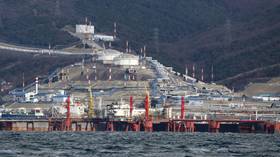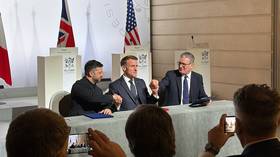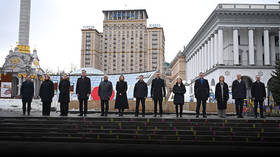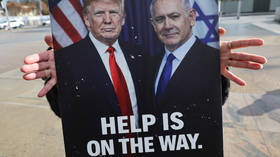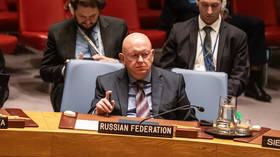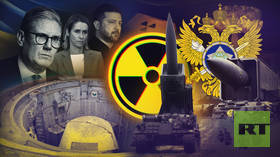ISIS role in destruction of Iraq by transnational elite
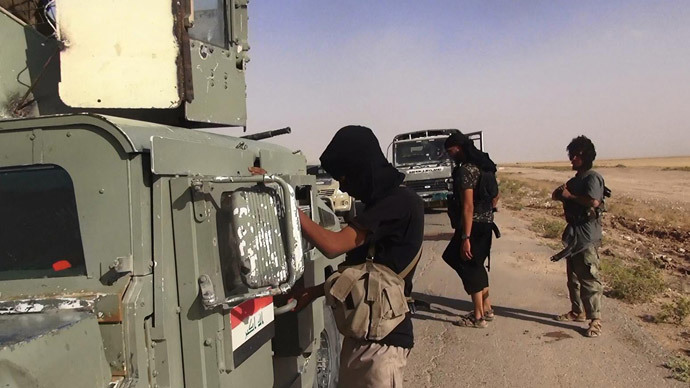
In an orgy of disorientation by the entire transnational elite, mainly based in the G7 countries, the real significance of the events in Iraq is buried under tons of untrue claims, or half-truths.
In fact, what is happening today in Iraq is neither a religious war between Sunnis and Shias, nor an anti-terrorism war against jihadists (ISIS). On the contrary, the transnational elite has now entered the final phase of its plan to either destroy the Middle East regimes that were based on national liberation movements (Baathist regimes in Iraq and Syria, Gaddafi’s regime in Libya), or at least to secure their submission to the new world order of neoliberal globalization (Iran). The main aim has always been to integrate them completely into the new world order, which emerged with the rise of transnational corporations and the parallel collapse of the Soviet bloc. The instruments used for this aim have ranged from all out military invasion, to brutal NATO bombings, and "coups from below." The latter is also the method used to integrate Ukraine.
This aim was declared as early as 2003, on the eve of the invasion of Iraq, by Charlene Barshefsky, the US Trade Representative, in a New York Times article with the eloquent title "The Middle East belongs in the world economy".
As she stressed then, “The Middle East has more trade barriers than any other part of the world. Muslim countries in the region trade less with one another than do African countries, and much less than do Asian, Latin American or European countries. This reflects both high trade barriers – tariffs in Egypt, Syria, Algeria and other major Arab states are all multiples of world averages – and the deep isolation Iran, Iraq and Libya have brought on themselves through violence and support for terrorist groups… And governments in the Middle East are less likely than those in any other region to participate in the World Trade Organization. Aside from Israel and Turkey, 8 of its 11 largest economies remain outside the WTO. This means that countries like Algeria, Saudi Arabia and Syria have little chance to open foreign markets fully to their goods, regardless of price or quality… In 1980, Muslim countries in the Middle East controlled 13 percent of world exports and received almost 5 percent of direct investment; today the figures are barely 3 percent of world exports and 1.5 percent of investment. Last year, the entire Muslim world received barely more foreign investment than Sweden.”
So, what Barshefsky lamented was that the Middle East was not integrated into the new world order as shown by the fact that most Arab countries were outside the WTO (World Trade Organization), which was established by the world elites exactly in order to enforce the rules of globalization and in particular the free movement of commodities. No wonder she found also deplorable the fact that the area was not open to the “benefits” of foreign investment by TNCs. Unsurprisingly, her conclusion was that “the Bush administration should seize this opportunity (i.e. the invasion!) to complement its fight against terrorism by bringing trade and economic liberalization to the region… through an integrated, long-term strategy for returning the Middle East to the world economy.”
This campaign, which began in 1991 with the Gulf War, went on throughout the 1990s with a ruinous embargo and continuous bombardments and was followed by the 2003 invasion that destroyed the country's infrastructure and turned a nation, which had made enviable achievements in meeting the basic needs of its people, back at least 100 years, not to mention, of course, the carnage.
The main political weapon used by the transnational elites, led from the US playing the role of gauleiter, after the invasion to reach its goal was the de-Ba'athification of the regime. The principal architects of this policy were two well-known American-Zionists, Paul Wolfowitz and Douglas Feith, who played a key role in the destruction of the Iraqi people (along, of course, with the architects of the war itself, i.e. Bush and Blair – the latter has already been rewarded for his services to the transnational elite and has become a ‘Labour’ multi-millionaire!
The goal was the elimination of any Ba’athist trace from the new client regime, which would eventually replace the occupation authorities. For the success of this objective, not only were all public employees dismissed (which meant even the dissolution of the army), but also they were banned from any future public sector employment. Thus the occupation forces denied any access to public places and power for any Iraqi who was associated in any way with the Ba’athist party. That is, the vast majority of Sunnis, which is over one third of the total population.
And so, we reach the roots of the current crisis. The entire political process in Iraq was designed to create a new client regime (or, alternatively, a set of small client states) that would be based on the well-known ethnic and religious divisions of the Iraqi people (Arabs 75 percent and Kurds 15 percent of the total population; Shias 60-65 percent and Sunnis 35-37 percent of the Islamic population). As it is well known, it was mainly the Sunnis who supported the national liberation movement and had carried out the nationalization of foreign oil companies, imposed social controls on markets, etc. On the other hand, the conservative part of the Kurdish movement in Northern Iraq (no relation to the progressive PKK Kurds) had a long association with the CIA and Mossad against the Ba’ath regime and, like the equally conservative Shias, they cooperated with Western invaders before and after the invasion.
Following the invasion and the effective autonomy of the Kurds (today even Zionist Israel supports a separate Kurdish state in the area!), the transnational elites based the political “stability” of post-Ba’ath Iraq on the inherent electoral majority of the Shias, who then proceeded to all sorts of discrimination against Sunnis. However, this was unprecedented since the Ba’ath regime was a purely secular regime and had never been accused of a similar scale of discrimination against Shias.
When, therefore, the West’s troops left Iraq last year in the aftermath of a 10 year criminal occupation, the final phase of the plan for the destruction of Iraq, through its partition (as with Yugoslavia), was put into effect.
The transnational elites used the jihadist organization ISIS as an instrument for this purpose. This does not necessarily mean that ISIS agreed to this role, and the possible attack by transnational elites against it in the future will illustrate the point.
ISIS is today embraced by large sections of the Sunni population as a liberation organization in a generalized insurgency against the Shia regime. On the other hand, the Iraqi Shias are supported even by the Islamic regime in Iran (which is based on a national liberation movement), just because they too are Shias, despite the fact they never took part in the Iraqi national liberation movement. In fact, in another clear indication of the miserable role the Iraqi Shias play, they just asked the Western powers and their military leadership to bomb their own country in order to destroy ISIS! In this way, the criminal invasion of the country is legitimized retrospectively even by an elected government. At the same time, the transnational elites will have the opportunity not only to enforce the partitioning of the country, but also to bomb ISIS, even inside Syria, where ISIS is well known for its atrocities against the Syrian people and the Syrian regime, which is also based on a national liberation movement. So, the ground will be prepared for the air bombardment of the Syrian people and its regime that was avoided last year in exchange for the destruction of Syria’s chemical weapons.
With regard to the fate of ISIS itself, there is no doubt that ‘objectively’ it functioned as a transnational elite ally against the Syrian Ba’athist regime, in order to achieve its obscure religious caliphate. However, this does not make it by itself an ‘instrument’ of the West, as it would become clear in case the West starts bombing it shortly.
Whether this happens or not will depend on the stand it intends to adopt in the event of Iraq’s final dismemberment along sectarian lines, as seems to be the transnational elite’s plan. In other words, apart from Northern Iraq that will become a Kurdish state (Israel already came out explicitly in favor of this invoking the “chaos” in Iraq for which it presumably does not share any blame!) the rest will be divided between Shias and Sunnis, provided two conditions are met by them.
First, they keep the religious character of the two new states and, second, and even more important, they are integrated, together with Kurdish Iraq, into the new world order of neoliberal globalization as client states of the Western powers and join all the appropriate international institutions controlled by it (WTO, IMF, WB etc.).
So, as long as the new caliphate meets these conditions the transnational elite will embrace it, as obviously Sunni Iraqis will be prevented from ever creating a new secular state based on national liberation ideals, like the Baathist regime—the main aim of the Iraqi invasion. On the other hand, if ISIS is not prepared to give the appropriate assurances to the West, the Western powers and their associates will simply smash it militarily, as happened to the Taliban regime before it.
At that point, the TE will have achieved its strategic goal of full integration of the Middle East into the NWO.
Takis Fotopoulos for
RT
* This article is an
expanded edited version of an article that was first published in
TF’s weekly column in Sunday’s Eleftherotypia (a Greek daily
published in Athens) on 29/6/2014. The translation was edited by
Jonathan Rutherford
The statements, views and opinions expressed in this column are solely those of the author and do not necessarily represent those of RT.
The statements, views and opinions expressed in this column are solely those of the author and do not necessarily represent those of RT.



